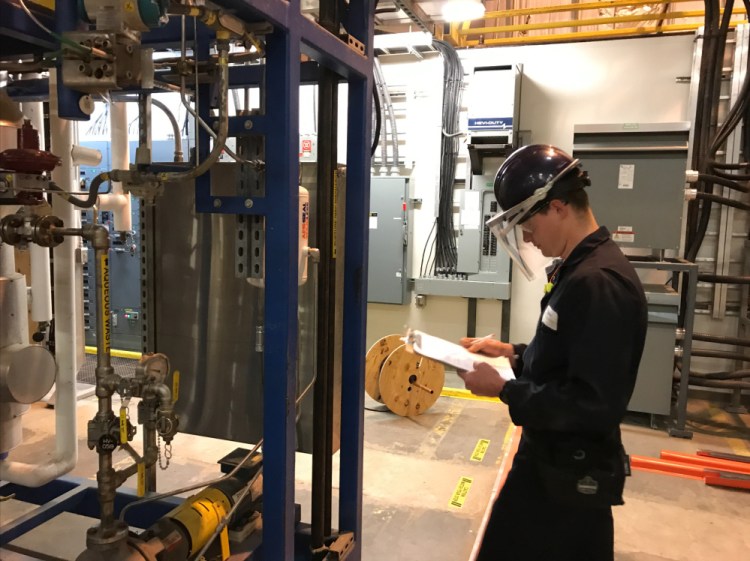OLD TOWN — The former Old Town Fuel and Fiber mill here could become the site of a $60 million production facility making a raw material that can help turn wood fiber into jet fuel, the president of a Massachusetts biotech company said Wednesday.
“The Old Town mill is one of the sites we’re looking at, but I think we can build several plants,” said Stephen Fitzpatrick, president of Biofine Technology LLC in Framingham, Massachusetts.
Fitzpatrick was on hand Wednesday at the University of Maine’s Technology Research Center, where a pilot plant that can process up to a ton a day of wood fiber into chemicals to make biofuels and biochemicals was undergoing advanced testing. The plant was on track to operate for 100 hours, a step to help prove its ability to operate at a commercial scale.
Media, government officials and business representatives were given a tour of the pilot plant, located inside the university’s facility in a corner of the mill.
The chemical acids produced by the plant — essentially a form of crude oil — are used in the university’s patented conversion technology to make diesel and jet fuel from woody biomass. The technology was developed by the Forest Bioproducts Research Institute.
Fitzpatrick said he thinks development has reached a point where his company could build a plant that takes at least 200 tons a day of biomass feedstock and convert it into 12,000 tons of crude oil a year. The company would like to break ground in roughly a year, he said, if it can make arrangements with the mill’s owner and private investors.
“The biggest obstacle now is financing,” he said.
The advances made by Biofine and the university come as Maine’s forest products industry is in transition. Five paper mills, including the one here at Old Town, have closed in the past three years, removing thousands of jobs and an estimated $1.3 billion from the state’s economy. That has created a surplus of wood and a broad selection of industrial sites in rural Maine. These and other factors are starting to attract investors, who see potential beyond paper in the state’s vast forests.
A group of Maine-based investors is seeking to buy the Old Town mill and turn it into a multi-tenant industrial park, the university said. The mill site along the Penobscot River, which includes a pulp mill, a 400,000-square-foot warehouse and biomass boiler, currently is owned by MFGR LLC, a consortium of asset liquidators. That interest also purchased the former Lincoln Paper and Tissue mill in 2015.
In remarks prior to the plant tour, Fitzpatrick referred to the vision a century ago of entrepreneurs who saw the wood supply and built a paper industry. Now paper is contracting, he said, but fuel is a product that can take advantage of the resource.
“Anywhere there’s a paper mill, we can put in one of our processes,” he said.
The pilot plant is a partnership between Biofine and UMaine. Biofine paid $200,000 to have a smaller-scale biofuel plant disassembled and moved from an industrial park in Gorham. It was reassembled in a 10,000-square-foot space in Old Town.
The plant appears as a long matrix of pipes and reactor vessels, where wood pulp that resembles fluffy insulation is fed into a conveyor. A black liquid appears 30 minutes later, along with a byproduct called biochar that also may have market potential.
During the test, the plant runs 24/7, with six workers on each shift to monitor and control operations. The test also produced organic acid salts made from old corrugated cardboard waste, which can be used to make jet fuel and diesel.
During the tour, Hemant Pendse, the institute’s director, held up a small beaker of the liquid. He noted that low worldwide petroleum prices have slowed progress on biofuels. It’s possible, he said, that heating oil and diesel fuel will become commercially viable before jet fuel, because they are easier to produce.
A Canadian company, Ensyn Corp., is ramping up production of a heating oil substitute made from waste wood and has begun supplying it to Bates College in Lewiston. Ensyn has expressed interest in building a biorefinery operation in Maine.
The forest bioproducts institute was formed in 2010. It has received roughly $18 million in state and federal funds over the years to pursue new products for the state’s emerging bio-based economy, focused on pulp, paper, food and nanocellulose, substances obtained from plant matter.
Tux Turkel can be contacted at 791-6462 or
tturkel@pressherald.com
Twitter@TuxTurkel
Send questions/comments to the editors.




Comments are no longer available on this story